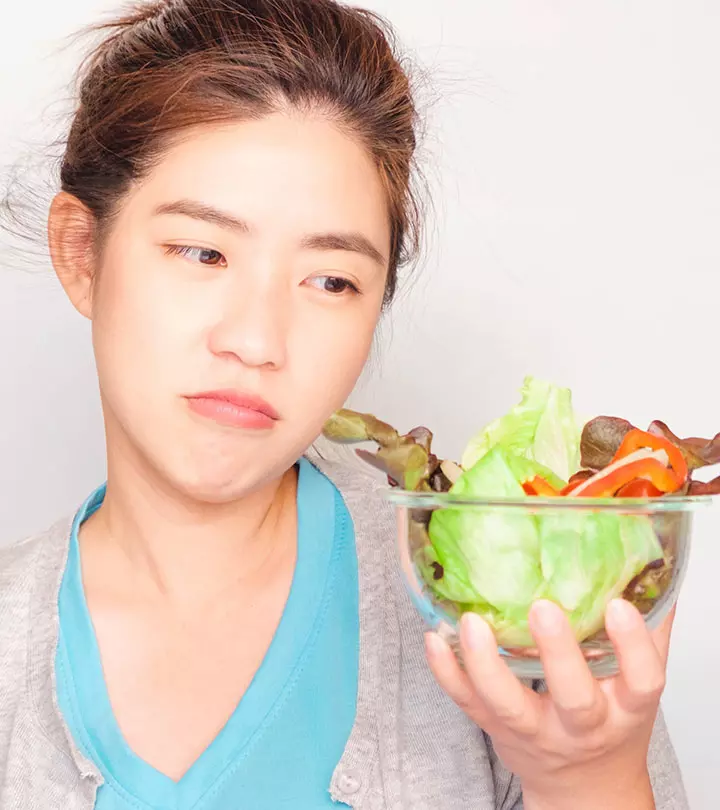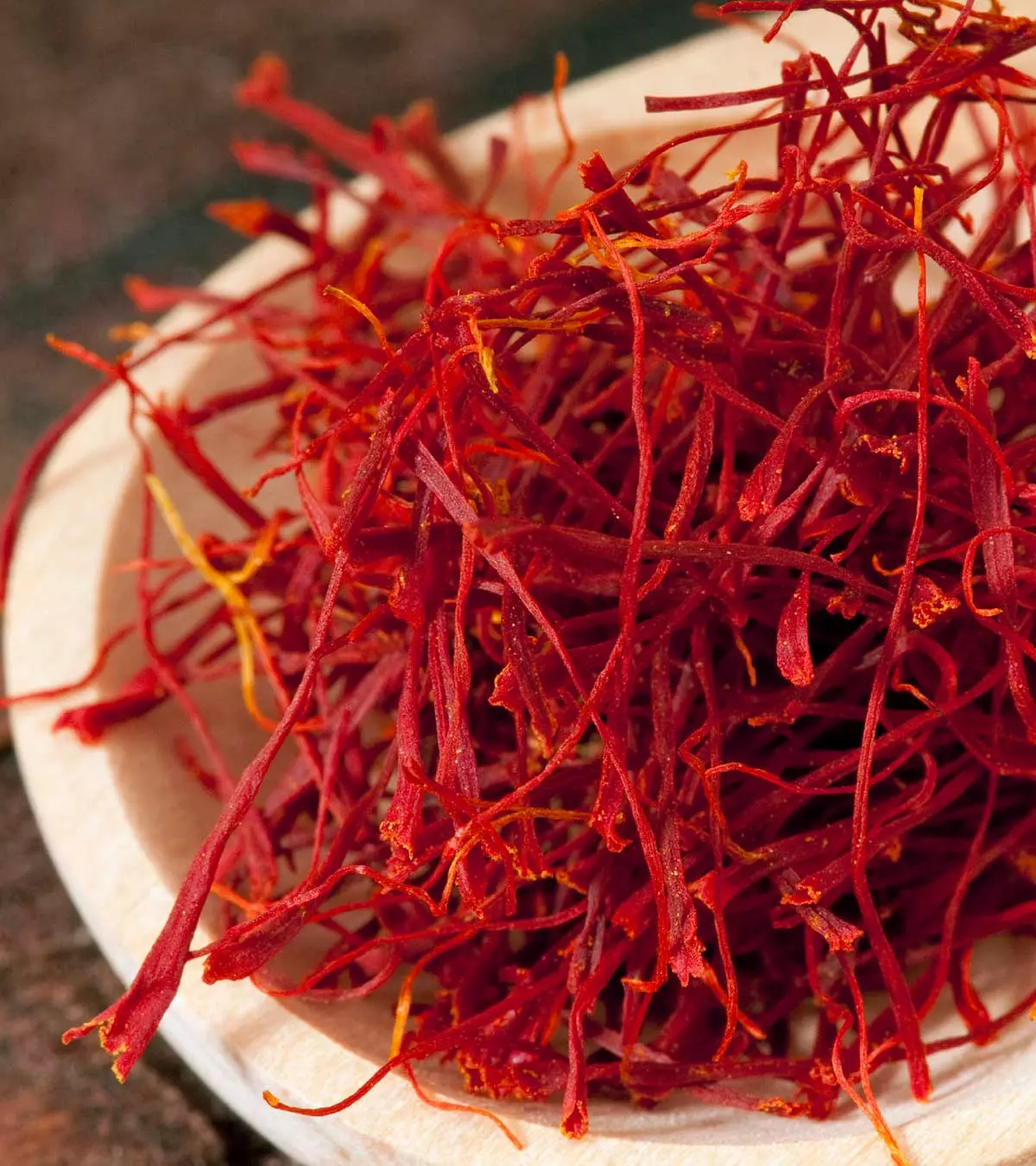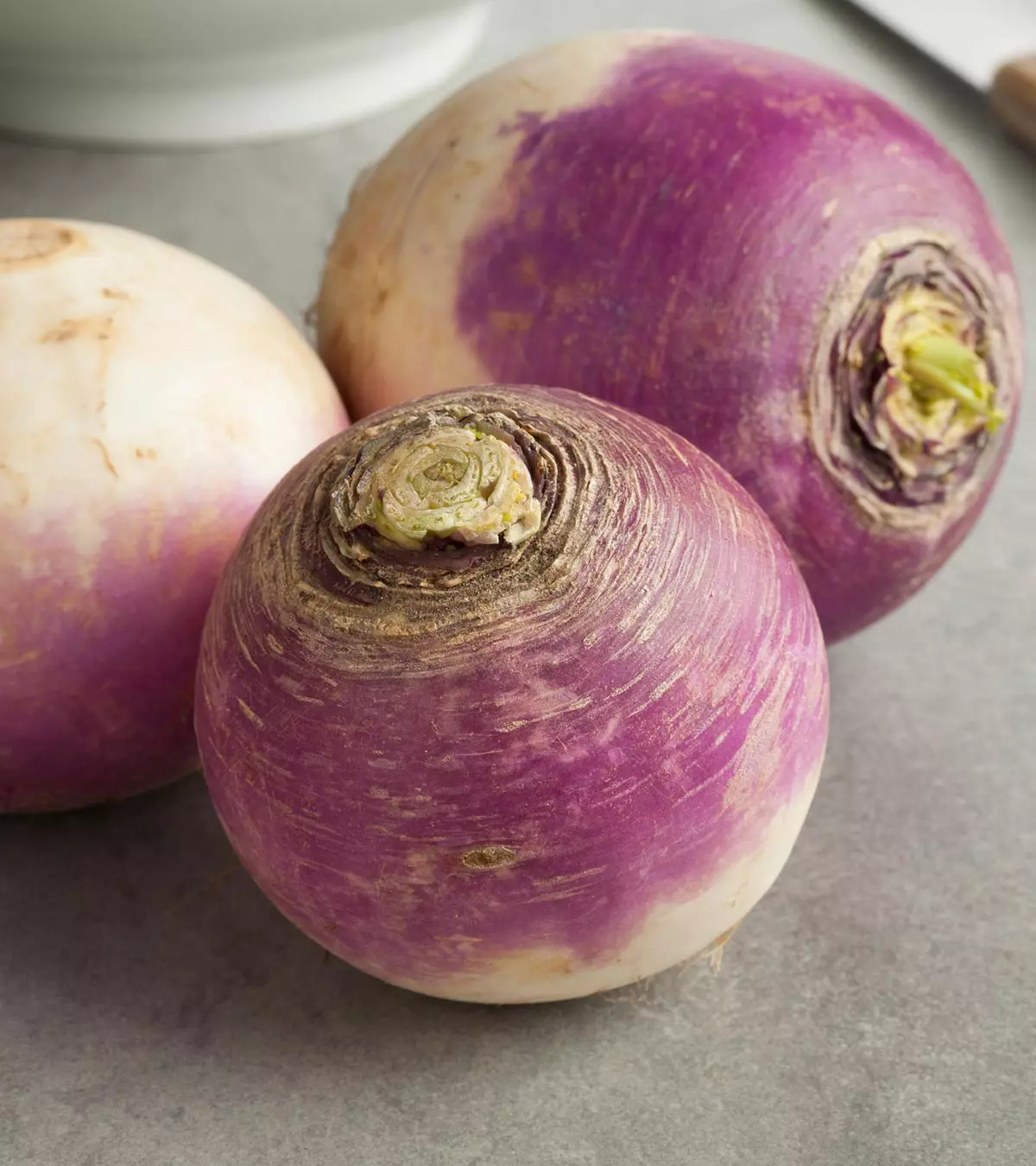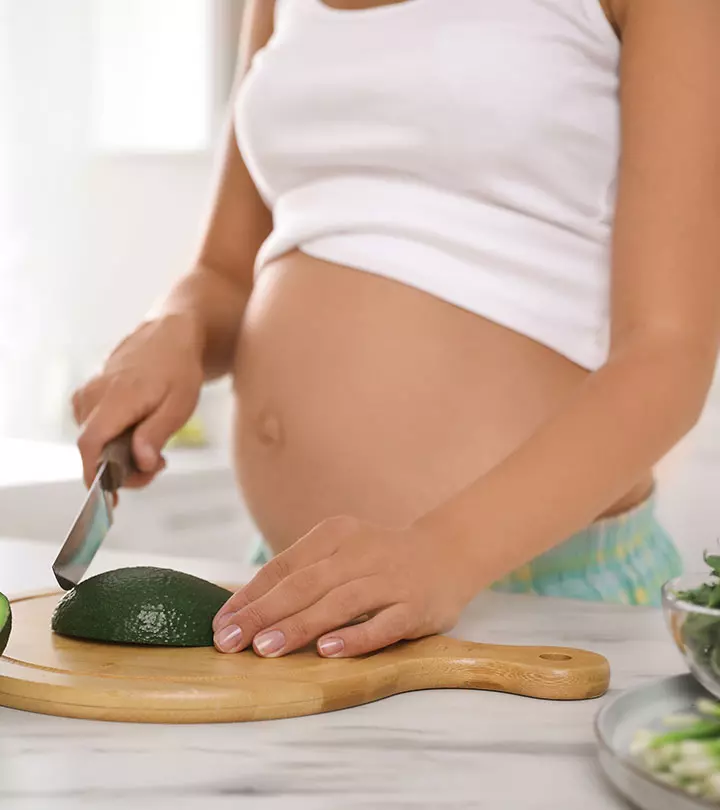
Image: Shutterstock

Avocados or butter fruits are popular due to their taste and nutritional value. But is it safe to consume avocados in pregnancy? These pear-shaped fruits are considered to be berries since they contain only one seed. You may enjoy them as part of several preparations. The fruit is also popularly consumed in the periconceptional periodiTime from conception to the early pregnancy since it may increase fertility in men and women (1).
Read this post to learn the benefits and precautions to take while consuming avocados in pregnancy and some delicious avocado recipes.
Key Pointers
- Avocados are safe to eat during pregnancy, especially in the early days.
- Avocados can treat anemia and help in digestion during pregnancy.
- It can also help deal with leg cramps and morning sickness during pregnancy.
- Remember to limit your avocado consumption to half a fruit every day.
- Eating a half-sliced avocado baked with an egg poach in the middle is delicious and healthy for pregnant women.
Are Avocados Good During Pregnancy?
Avocados are safe and nutrient-dense foods to eat during pregnancy, as they contain high amounts of key nutrients –folate and potassium that are important for fetal growth and development. These superfoods are packed with good fats, and other vitamins and minerals, all of which positively impact pregnancy.
What Are The Benefits Of Avocados During Pregnancy?
, an Argentina-based dietitian nutritionist, says, “Avocados are a high-calorie food that can help increase fetal weight. They’re also high in healthy fats like omega-9 fatty acids and potassium, which are good for your and your baby’s heart. I frequently suggest pregnant patients to eat one small or half medium avocado per day, as more than that could lead to unwanted weight gain. Avocados can be spread on whole grain toast with egg for breakfast, used to replace dressing on salads for lunch, or blended into smoothies for snacks.”
The various benefits of eating avocado fruits, also known as butter fruits, are as follows.
1. Excellent source of folate
Folate, also known as Folacin or vitamin B9, is an essential vitamin that supports the proper growth and development of the fetus. Lack of sufficient folate (or folic acid) can cause congenital disabilities or birth defects in babies. Therefore, optimum intake of folate during pregnancy is crucial. Avocados are a rich source of folate that provides about 19mcg of folate per ounce of the fruit (2).
2. Treats anemia
Deficiency of iron during pregnancy can lead to anemia in pregnant women. Avocados contain abundant amounts of iron necessary during pregnancy (3).
3. Aids digestion
Stomach illnesses and constipation are common during pregnancy. The rich fiber content in avocado acts as a prebioticiDietary fibers that promote the development of good bacteria in the gut and improves the microflora diversity in the colon (4).
4. Packed with vitamins
The butter fruit is packed with vitamins B1, B2, B5, B6, C, E, and K, all of which are essential for maternal diet and important for the growing fetus (7).
5. Combats morning sickness
This is another common early pregnancy symptom that leaves you tired in the first three months. Vitamin C-rich avocados are useful in dealing with the problem (6).
6. Maintains cholesterol and sugar levels
Regular consumption of avocado helps in keeping cholesterol (7) and sugar levels in control during pregnancy(5)
.
7. Relieves leg cramps
Leg cramps are also common during pregnancy, and avocados can provide relief from leg cramps. They have more potassium than bananas. Potassium, along with calcium, can help ease cramping. (11).
8. Boosts fetal brain development
A single cup of avocado contains 22mg of cholineiA vitamin B complex nutrient that the body needs in minimal doses to function and remain healthy that is necessary for fetal brain and nerve development and also nerve development (8).
9. Rich in minerals
Avocado contributes to your daily recommended intake of calcium, potassium, magnesium, niacin (also known as vitamin B3), phosphorus, copper, zinc, and manganese all of which are essential during pregnancy (9).
10. Helps in nutrient absorption
Not only do avocados provide nutrients, but they also help your system absorb nutrients from other foods. For instance, avocados make the absorption of fat-soluble vitamins found in foods like sweet potatoes, leafy greens, and carrots (10) possible.
11. Full of healthy fat
During pregnancy, extra calories are required for the growth of the fetus, and it is crucial to consume good fats for optimal maternal health. Avocados contain omega-3 and omega-6 fatty acids that are beneficial for both you and your unborn baby (11).
Sara-Marie, a mother to a beautiful girl, recalls her cravings when she was pregnant. She writes, “When I knew I needed some type of substance in addition to my other favorite watermelon I turned to my BFF the avocado. I knew the healthy fat content would keep me full a little longer and hopefully keep the nausea at bay. Sometimes I’d just eat a whole avocado for lunch (i).”
12. Lowers the risk of weight gain
As avocados are high in dietary fiber, they help lower the chances of tremendous weight gain. Almost 25% of fiber is soluble that helps friendly bacteria in the digestive tract improve metabolic health (11).
13. Reduces the risk of preeclampsia
The rich potassium levels in the fruit help lower the chance of preeclampsiai as may reduce blood pressure levels, thereby, promoting heart health. It could, therefore, decrease the risk of heart issues in the future.
Since avocados offer such amazing benefits, you should definitely know the nutritional facts of the fruit.
Nutritional Value Of Avocado
A 100g avocado contains the following nutrient values as per the USDA (United States Department of Agriculture) (12):
| Nutrient | AMOUNT PER 100g |
|---|---|
| Total calories | 160kcal |
| Total fat | 14.7g |
| Saturated fat | 2.13g |
| Polyunsaturated fat | 1.82g |
| Monounsaturated fat | 9.8g |
| Cholesterol | 0mg |
| Sodium | 7mg |
| Potassium | 485mg |
| Total Carbohydrate | 8.53g |
| Dietary fiber | 6.7g |
| Sugars | 0.66g |
| Protein | 2g |
| Vitamin A | 7mcg |
| Vitamin C | 10mg |
| Calcium | 12mg |
| Iron | 0.55mg |
Though avocados are absolutely beneficial, you must have a cap on the quantity you eat.
How Much Avocado Should You Eat In A Day?
An avocado a day keeps the neurologist away. However, it is best to limit your daily intake to half a fruit as over-consumption could lead to a few, though rare, side effects.
 Quick tip
Quick tipSide Effects Of Avocado During Pregnancy
Here are the situations where you may have to limit or stop eating avocados are:
- If you are trying to manage weight, avoid consuming the fruit in excess. The high calories, though from good fats, can add up.
- If you are allergic to latex then be cautious with avocados as the fruit has been linked to latex allergiesiAn allergic response to natural rubber latex, which is obtained from the sap of the rubber tree (13).
It’s important to check with your healthcare provider in these cases. Always consult your doctor about your diet during pregnancy, especially if you have any health concerns or conditions.
When Is The Best Time To Eat Avocado While Pregnant?
Avocados can be eaten safely throughout pregnancy. It is among the best fruits to eat during pregnancy because of its high folate content. Low folate levels in the early stages of pregnancy are associated with neural tube defects (14). Including avocado in your prenatal diet can help reduce the risk of deficiency-related birth defects.
In the next section, we will tell you the different ways to include the fruit in your diet.
Simple Avocado Recipes
To include avocado every day, you can try the below easy recipes.
1. Raw avocado smoothie
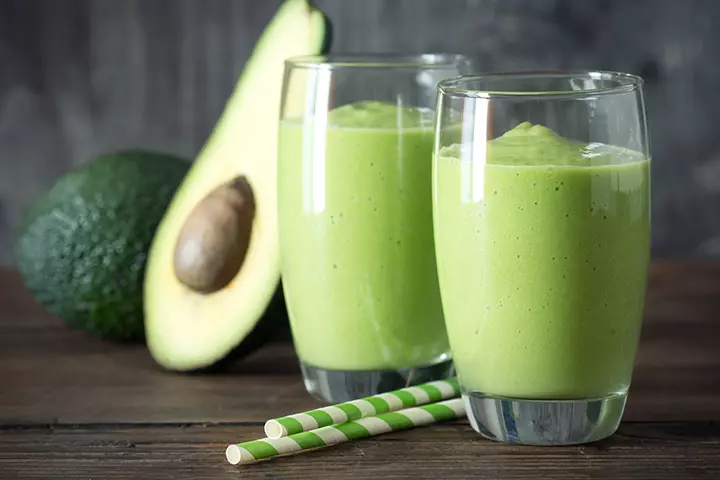
Image: IStock
You will need:
- ½ avocado, peeled and pitted
- 1 cup filtered water
- ½ green apple
- 1 banana, peeled
- 1 lemon, peeled
- 1 orange, peeled
- ½ lime, peeled
- 1 big bunch parsley
- Ice
How to:
- Put all the above ingredients in a blender.
- Blend it slowly, and increase the speed gradually.
- Let it blend for about one minute or until you get a smooth consistency.
- Raw avocado smoothie is ready to drink.
Preparation time:
5 min
Servings: One or two
2. Baked eggs in avocado:
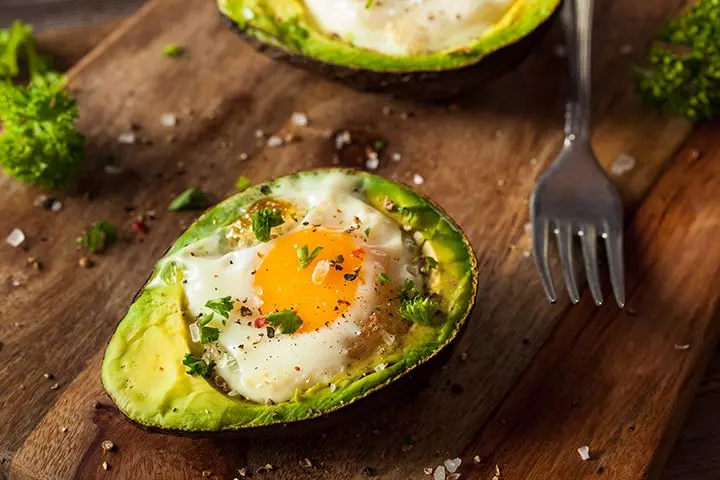
Image: IStock
You will need:
- 2 avocados, ripe
- 4 eggs
- 1/8 tsp pepper
- 1 tbsp chopped chives
How to:
- Preheat the oven to 425°F.
- De-seed the avocados, and slice them in half. Scoop out some flesh from the center so that the egg can fit in.
- Place the half sliced avocados on a baking tray and crack one egg in each of the halves.
- Try to crack it in a way that the yolk goes first and then the egg white to cover the rest.
- Bake for about 15 minutes. Cooking time may vary. Ensure that the egg white is set properly.
- Once baked, remove and top them with pepper and chives. You can also add any other garnishing of your choice.
Preparation time:
30 min
Servings: Two
3. ALT (avocado, lettuce, and tomato) sandwiches

Image: IStock
You will need:
- 1 avocado, peeled and sliced
- 4 large leaves of Romaine/ Boston lettuce
- 1 large, ripe tomato, sliced
- 8 slices whole-grain bread with flaxseed, toasted
- 12 thin slices cucumber
- 2 tbsp mayonnaise, fat-free
- 4 slices Swiss cheese, reduced fat and reduced sodium version
How to:
- Spread mayonnaise evenly on bread slices.
- Layer 4 slices of bread with 1 lettuce leaf, 1 slice avocado, 1 slice tomato, 3 slices cucumber, and 1 slice Swiss cheese. Top them with remaining 4 bread slices each.
- Cut each of the sandwiches diagonally, and they are ready.
Preparation time:
15 min
Servings: Four
A mother and a blogger shares her go-to avocado sandwich recipe during pregnancy, “Toast the bread and slather on some honey mustard. Top with sliced and slightly mashed avocado to adhere to the bread a bit. Sprinkle on a little sea salt and freshly ground black pepper. Add onions, and the cheese, tomatoes, plus all that lettuce! This was my favorite sandwich when I was pregnant and continues to be a go-to when I’ve gotta have something easy, yummy, and filling (ii).”
4. Guacamole
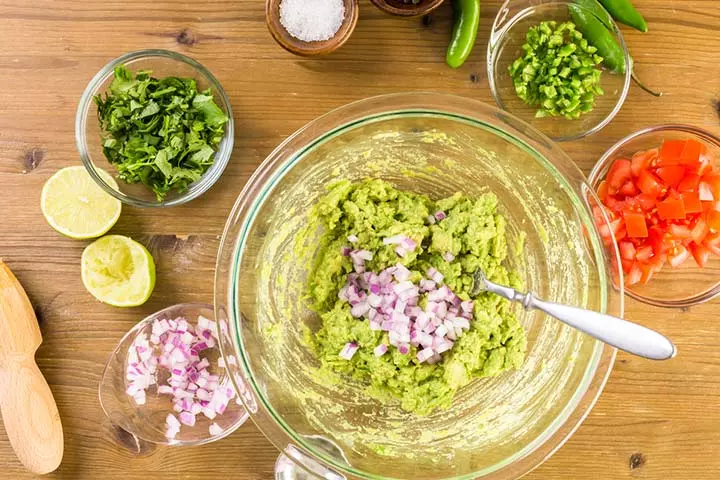
Image: Shutterstock
You will need:
- 3 medium-sized avocados
- 1 firm tomato, finely chopped
- ½ white onion
- ½ cup cilantro, chopped
- 2 tbsp lemon juice, freshly squeezed
- Salt and pepper (optional)
How to:
- Cut the avocados in half, and scoop out the flesh.
- Use a fork to mash the flesh so that any hard parts are softened.
- Add all the other ingredients and stir them properly.
- You can use it right away or refrigerate it.
Preparation time:
10min
Servings: Two and a half cups
 Quick tip
Quick tipSo, quickly make these recipes and enjoy the taste and health, all in one.
Below, we cover a few questions that expecting couples may have regarding avocados during pregnancy.
Frequently Asked Questions
1. Is it safe to eat avocado with black or brown spots?
Avocados turn black or brown when they are exposed to cold temperatures for a long time before they begin to ripen. The discoloration also occurs as a result of compression with excessive handling. The fruits can be eaten by removing those spots with a knife.
2. Are avocado seeds edible?
It is not recommended to eat avocado seeds as there is not enough research to support their consumption. However, there are studies on the potential benefits of avocado seed extracts rather than the seeds. The extract is known to have antioxidantiNatural or synthetic compounds that slow down certain types of cell damage , anti-carcinogeniciSubstances or chemicals that stop or prevent the growth of cancer cells , and anti-inflammatory properties that are advantageous for cancer prevention and inflammation reduction. (15).
3. What happens if you eat too much avocado?
If you overeat avocados, it will likely cause weight gain.
4. Does eating avocados make you fat?
Eating more calories than the body requires, no matter the source, can lead to weight gain. Avocados are high in healthy, monounsaturated fat. Your body requires this kind of fat for energy, absorbing fat-soluble vitamins (A,D,E,K), and mental focus.
5. Is guacamole healthy during pregnancy?
Guacamole is an avocado-based dip that contains abundant monounsaturated fatty acids. It can be used as a dip or spread for chips, crackers, sandwiches, and wraps. Incorporating guacamole into your meals during pregnancy can provide you with valuable nutrition.
6. Can avocado cause stomach pain in pregnancy?
Avocados can cause stomach pain in pregnant women who are allergic to them. They may experience allergic reactions such as runny nose, tearing, and lip swelling followed by consumption (16). Sometimes, overconsumption can lead to stomach aches, although you are not allergic to avocados. You may consume avocados in moderation to get benefits.
7. How should I select avocados?
“My recommendation is to buy them in bulk when they’re on sale, choosing the majority with green skin so you know they still need a few days to be fully ripe. I keep them all in the fridge and take one or two out as needed, leaving them at room temperature until they’re perfectly ripe. When the skin has a darker color and the avocado yields to gentle pressure without leaving indentations or feeling mushy, they are ready to eat,” suggests De Angelis.
8. How can I include avocados in my pregnancy diet?
You can easily incorporate avocados into your meals by adding them to smoothies, salads, or spreads. For breakfast, try avocado toast topped with eggs. Enjoy sliced avocado with a sprinkle of salt and lemon juice for snacks.
Consuming moderate quantities of avocados during pregnancy is safe and beneficial for the mother-to-be and her unborn. Avocados are rich sources of folate, vitamins, and iron, essential for a baby’s development. Moreover, this fruit alleviates digestive issues, leg cramps and regulates sugar and cholesterol levels in pregnant women. Therefore, you may add avocados to your pregnancy diet in a raw form or include them in various foods and preparations such as smoothies and sandwiches. Also, talk to your doctor about the right quantity to consume to avoid health complications.
Infographic: Tips To Include Avocado In Your Pregnancy Diet
An avocado is a tasty option for a healthy pregnancy diet. But how can you have it every day without getting bored? This infographic will help you with tips for adding avocados to your meals and snacks to keep them interesting. Dive in, and don’t forget to save it whenever you want to cook up a meal.
Some thing wrong with infographic shortcode. please verify shortcode syntax
Pregnant women have to be cautious of the food they consume. Are you wondering if avocados are beneficial for pregnant women? Watch this video to learn how avocados can benefit both you and your baby.
Personal Experience: Source
MomJunction articles include first-hand experiences to provide you with better insights through real-life narratives. Here are the sources of personal accounts referenced in this article.
i. 5 Foods I don’t feel guilty for craving during pregnancy;https://smponsie.blogspot.com/2013/06/5-foods-i-dont-feel-guilty-for-craving.htmlii. Avocado cheddar sandwich: Who needs a deli when you can have this?;
https://fullbellysisters.blogspot.com/2012/01/avocado-cheddar-sandwich-who-needs-deli.html
References
- Kevin B. Comerford et al.; (2016); The Role of Avocados in Maternal Diets during the Periconceptional Period, Pregnancy, and Lactation.
https://www.ncbi.nlm.nih.gov/pmc/articles/PMC4882725/ - Folic Acid and Folate Values for Selected Foods.
http://www.cchealth.org/folic-acid/list.php - Ways to boost blood iron levels while eating a vegan or vegetarian diet.
https://scopeblog.stanford.edu/2017/10/06/ways-to-boost-blood-iron-levels-while-eating-a-vegan-or-vegetarian-diet/ - Avocados.
https://nutritionsource.hsph.harvard.edu/avocados/ - Mark L. Dreher and Adrienne J. Davenport; Hass Avocado Composition and Potential Health Effects.
https://www.ncbi.nlm.nih.gov/pmc/articles/PMC3664913/ - Start_Smart_Pregnancy_Book/.
https://ldh.la.gov/assets/docs/Making_Medicaid_Better/Resources/CCN_RFP_Proposals/LA_Healthcare_Connections/Start_Smart_Pregnancy_Book_EnglishFINAL.pdf - An avocado a day may keep cholesterol at bay.
https://www.health.harvard.edu/staying-healthy/an-avocado-a-day-may-keep-cholesterol-at-bay - Kevin B. Comerford et. al; (2016); The Role of Avocados in Maternal Diets during the Periconceptional Period, Pregnancy, and Lactation.
https://www.ncbi.nlm.nih.gov/pmc/articles/PMC4882725/ - In Case You Need a Reason to Eat More Avocado.
https://www.cedars-sinai.org/blog/healthy-and-delicious-avocado.html - Victor L Fulgoni, III et. al; (2013); Avocado consumption is associated with better diet quality and nutrient intake, and lower metabolic syndrome risk in US adults: results from the National Health and Nutrition Examination Survey (NHANES) 2001–2008.
https://www.ncbi.nlm.nih.gov/pmc/articles/PMC3545982/ - Healthy-Child-Guide.
https://naviauxlab.ucsd.edu/wp-content/uploads/2016/11/Healthy-Child-Guide-4-22-16.pdf - Avocado, raw.
https://fdc.nal.usda.gov/fdc-app.html#/food-details/1102652/nutrients - Fruits.
https://farrp.unl.edu/informallfruit// - About Folic Acid.
https://www.cdc.gov/folic-acid/about/?CDC_AAref_Val=https://www.cdc.gov/ncbddd/folicacid/features/folic-acid-helps-prevent-some-birth-defects.html - A Colored Avocado Seed Extract With Antioxidant, Anti-carcinogenic And Anti-inflammatory Effects.
https://etda.libraries.psu.edu/catalog/12666 - Three Less Common Food Allergies You Might Not Know About.
https://www.allergycliniclondon.co.uk/three-less-common-food-allergies-you-might-not-know-about/ - Avocado.
https://nutritionsource.hsph.harvard.edu/avocados/#
Community Experiences
Join the conversation and become a part of our nurturing community! Share your stories, experiences, and insights to connect with fellow parents.
Read full bio of Dalia Kinsey
- Eva De Angelis is a dietitian nutritionist and chef from Argentina. She holds a BS in Human Nutrition and Dietetics from Universidad ISalud and is in private practice.
 Eva De Angelis is a dietitian nutritionist and chef from Argentina. She holds a BS in Human Nutrition and Dietetics from Universidad ISalud and is in private practice.
Eva De Angelis is a dietitian nutritionist and chef from Argentina. She holds a BS in Human Nutrition and Dietetics from Universidad ISalud and is in private practice.
Read full bio of Swati Patwal
Read full bio of Rebecca Malachi
Read full bio of Aneesha Amonz

 Did you know?
Did you know?





